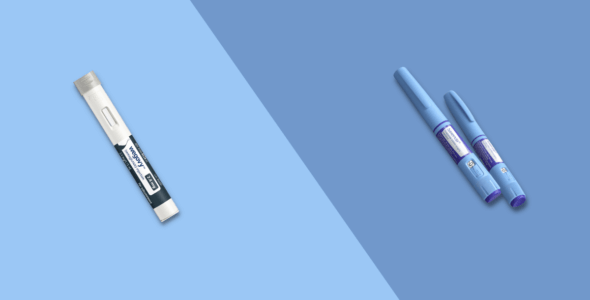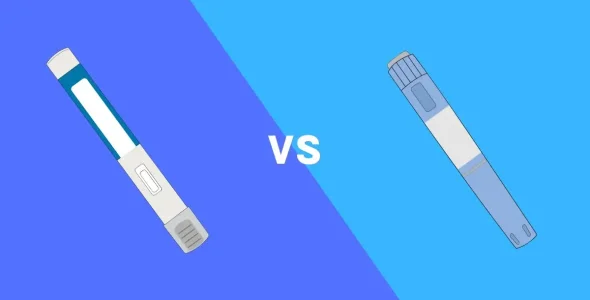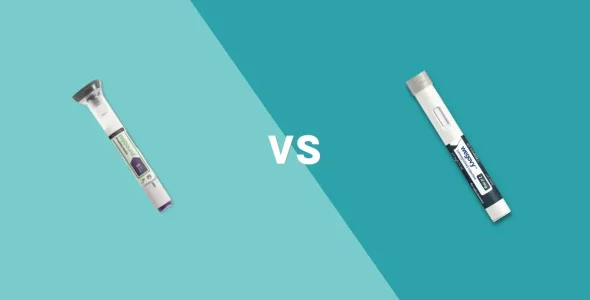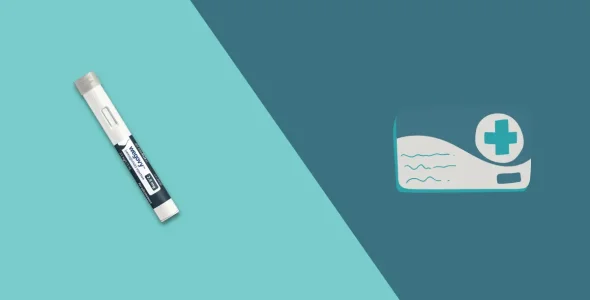Wegovy side effects: What to expect and how to manage them
Wegovy side effects: What you need to know.
Key highlights
- The most common side effects of Wegovy are nausea, diarrhea, bloating, indigestion, constipation, abdominal pain, flatulence, gastroenteritis, and gastroesophageal reflux disease (heartburn).
- The most serious side effects of Wegovy include risk of hypoglycemia (low blood sugar) in patients with type 2 diabetes, thyroid C-cell tumors/ thyroid cancer, acute pancreatitis (inflammation of the pancreas), acute gallbladder disease, acute kidney injury or renal impairment – monitor renal function when initiating or escalating doses if severe adverse gastrointestinal reactions occur, allergic reactions, diabetic retinopathy complications in patients with Type 2 Diabetes, increase in heart rate and suicidal thoughts.
- To avoid the most common side effects of Wegovy, it is recommended to eat bland, low-fat foods, eat foods that contain water, avoid lying down after you eat, eat slowly, and go outdoors for fresh air.
The World Health Organization (WHO) reported that, globally, 16% of adults aged 18 years and older were obese in 2022. The prevalence of obesity worldwide more than doubled between 1990 and 2022.
Wegovy (semaglutide) is an FDA-approved weekly injectable weight loss medication. The active ingredient, semaglutide, was approved by the U.S. Food and Drug Administration (FDA) in 2021 for chronic weight management in adults and children 12 and older with obesity and for adults who are overweight with one or more weight-related health conditions, like type 2 diabetes, high cholesterol, or high blood pressure.
In addition to weight loss, Wegovy is approved to lower the risk of serious heart problems like heart attacks and stroke in obese or overweight adults with heart disease.
Wegovy is a safe and effective chronic weight management medication. Still, it can cause some gastrointestinal side effects such as nausea, vomiting, diarrhea, abdominal pain, decreased appetite, and constipation, especially in the first few weeks of treatment.
Most side effects are mild, but awareness of them helps you set realistic expectations. This knowledge empowers you to make informed decisions about your treatment and better manage any issues that may come up.
Worried about Wegovy side effects? Learn about common and rare side effects, how to manage them, and when to seek medical advice.
Most common side effects of Wegovy
Wegovy can cause gastrointestinal side effects such as nausea, vomiting, diarrhea, constipation, stomach pain, bloating, burping, loss of appetite, heartburn, and upset stomach. These gastrointestinal side effects can make you feel tired.
These side effects are usually temporary, especially in the first few weeks of treatment, but will generally go away over time. Talk to a healthcare provider if they get severe or don’t go away.
Gastrointestinal-related side effects (most frequent)
Nausea (44%)
Nausea is one of the most common side effects of Wegovy, affecting about 44% of people who use it. It typically happens when you first start the medication and may go away after a few weeks as your body adjusts. If nausea becomes severe or doesn’t improve, it’s important to talk to your doctor for advice on how to manage it.
Diarrhea (30%)
Diarrhea is another common side effect of Wegovy, affecting about 30% of people. Like nausea, it is usually temporary and may lessen after your body gets used to the medication. If diarrhea becomes persistent or severe, you should consult your healthcare professional for guidance.
Vomiting (24%)
Vomiting is a side effect that affects about 24% of people taking Wegovy. It is usually temporary and may improve as your body adjusts to the medication. If vomiting continues or is severe, it’s a good idea to contact your doctor for advice.
Constipation (24%)
Constipation affects about 24% of people using Wegovy. It is usually temporary and may improve as your body gets used to the medication. If constipation becomes persistent or bothersome, talk to your doctor for advice on managing it.
Constipation can often be managed with dietary changes and over-the-counter remedies. Increasing fiber intake, drinking plenty of water, and using stool softeners or laxatives (with your doctor’s approval) can help relieve constipation.
Abdominal pain (20%)
Abdominal pain affects about 20% of people taking Wegovy. This discomfort is usually temporary and may go away as your body adjusts to the medication. If the pain persists or is severe, it’s important to talk to your doctor for advice on how to manage it.
Tips to manage gastrointestinal side effects of Wegovy
If you have gastrointestinal side effects when starting treatment, you can help manage them by:
- Eating smaller meals
- Eating slowly
- Eating bland and low-fat foods
- Selecting more bland, low-fat foods (like crackers, toast, and rice)
- Eating mindfully and stopping when full
- Increasing fiber and water
- Avoiding greasy, fried foods
- Adding fruits, vegetables, and whole grains to your diet
- Sitting up after meals
- Exercising
- Sleeping better
Other common side effects
Headache (14%)
Headaches occur in 14% of people taking Wegovy. This could be due to low blood sugar levels which is a side effect of the medication. If headaches become frequent or severe talk to your doctor especially if you’re also experiencing signs of low blood sugar.
Fatigue (11%)
Fatigue occurs in 11% of people taking Wegovy. If you’re feeling unusually tired, it could be the medication, but also make sure to rule out other causes. If tiredness becomes persistent or bothersome, talk to your doctor.
Dyspepsia (9%)
Dyspepsia or indigestion occurs in 9% of people taking Wegovy. It can cause discomfort in the stomach, such as bloating, pain, or feeling full. If dyspepsia continues or becomes troublesome, talk to your doctor for advice.
Dizziness (8%)
Dizziness occurs in 8% of people taking Wegovy. If you experience dizziness, be careful with activities that require alertness, such as driving or operating heavy machinery. If dizziness persists or worsens, talk to your doctor.
Less common but serious side effects
While rare, Wegovy can cause serious side effects that require prompt medical attention:
- Pancreatitis (inflammation of the pancreas): Some people in studies taking Wegovy had acute pancreatitis, which is a sudden inflammation of the pancreas. This has also happened with other similar drugs, and in rare cases, it has been deadly. In the studies, 5 people taking Wegovy had pancreatitis compared to 1 person taking a placebo (inactive treatment). Warning signs include severe abdominal pain, back pain radiating to the back, nausea, and vomiting.
- Gallbladder problems: Wegovy can cause gallbladder problems, like gallstones or gallbladder inflammation, and may even lead to surgery. Fast weight loss can increase the risk, but you can still have these issues without losing body weight. Gallbladder problems are less common than stomach side effects with Wegovy, but they can be more serious. Keep a watch on symptoms such as upper stomach pain, fever, jaundice (yellowing of skin and eyes), and clay-colored stools.
- Kidney problems: In people with kidney issues, diarrhea, nausea, and vomiting can cause dehydration, which can worsen kidney problems. Signs include reduced urination, swelling in the extremities, fatigue, and difficulty breathing.
- Low blood sugar (hypoglycemia): Low blood sugar (hypoglycemia) can happen with Wegovy, but it’s not common. The risk is higher if you also take diabetes medicines like insulin or sulfonylureas (such as glipizide, glimepiride, or glyburide). Wegovy slows how your stomach empties, which can affect how other medicines work. In studies, low blood sugar happened in 6% of people taking Wegovy and 2% taking a placebo. It can also occur in people without type 2 diabetes using similar drugs.
- Severe allergic reactions: Some people have had serious allergic reactions to semaglutide, the main ingredient in Wegovy. In rare cases, these reactions can be life-threatening. Stop using Wegovy and seek medical help immediately if you experience any of the following signs of a serious allergic reaction: rash, hives, swelling of the face/lips/tongue/throat, and difficulty breathing.
- Vision changes (Diabetic retinopathy): A quick drop in blood sugar can sometimes cause a temporary worsening of diabetic eye disease (diabetic retinopathy). Symptoms may include blurry vision, loss of central vision, color blindness, and floaters.
- Increased heart rate (Tachycardia): Wegovy can increase your heart rate at rest. If you experience a racing, pounding, or fast heartbeat that lasts for several minutes, notify your healthcare provider. Seek help for a noticeably rapid or pounding heartbeat without exertion.
- Depression or suicidal thoughts: Look out for any changes in your mood, behavior, thoughts, or feelings. Contact your healthcare provider if you notice any new or worsening mental changes. It is important to seek immediate medical help for new or worsening feelings of sadness, anxiety, or thoughts of self-harm.
- Risk of Thyroid C-cell Tumors: Wegovy has a serious but rare warning about a possible risk of thyroid tumors or cancer, seen in animal studies. It’s not known if it causes this in people, but the FDA includes a strong warning about it. You should not use Wegovy if you or a family member has had a type of thyroid cancer called medullary thyroid carcinoma (MTC) or a condition called Multiple Endocrine Neoplasia syndrome type 2 (MEN 2). Your healthcare provider will check for symptoms like a lump or swelling in the neck, hoarseness, trouble swallowing, and difficulty breathing.
- Food or liquid entering lungs (Aspiration): In November 2024, the FDA added a warning to Wegovy and similar drugs about a rare risk of food or liquid entering the lungs (aspiration) during surgery with anesthesia. This can happen even if patients follow fasting rules before the procedure. Before having surgery or any procedure with anesthesia or deep sedation, tell all your doctors that you take Wegovy (semaglutide).
Long-term side effects and safety concerns
Wegovy is a glucagon-like peptide-1 (GLP-1) receptor agonist that contains the same active ingredient, semaglutide, as Ozempic and Rybelsus for type 2 diabetes. It works by mimicking the GLP-1 receptor, a natural hormone that releases insulin, reduces glucagon, and controls appetite, so you eat less. Together, these effects make it easier to lose weight when used with a healthy diet and exercise.
Long-term use of Wegovy has been shown to have positive effects on heart and metabolic health by helping with weight loss and conditions like high blood pressure and cholesterol.
A comprehensive analysis of 11 large clinical trials with over 85,000 participants found that GLP-1 receptor agonists like semaglutide reduced the risk of kidney failure by 16% and worsening of kidney function by 22%. They also reduced cardiovascular events by 14%, including heart attack and stroke, compared to a placebo.
For metabolic health, Studies show that Wegovy can help with long-term weight loss. The SELECT trial which ended in 2023 showed that Wegovy not only helps with weight loss but also heart health even without significant weight loss. This means Wegovy may have broader applications including for heart failure.
One of the concerns with Wegovy and other weight loss medications is weight regain after discontinuation. Studies show that while Wegovy helps you lose weight, most of the weight loss is regained when you stop the medication.
Less common or delayed side effects
While Wegovy works for weight loss, it can have some less common or delayed side effects that may develop over time. These side effects may not always be immediate but could be uncomfortable or concerning as treatment goes on.
Wegovy face
One of the side effects of significant weight loss with Wegovy is facial fat loss, also known as “Wegovy face”. This happens as the body loses fat all over, including the face, and gets more gaunt or older-looking.
Weight loss, especially rapid weight loss, can affect not only fat around the body but also fat under the skin, including on the face. The face can lose volume and you might get hollow cheeks, sagging skin and overall tired or older looking.
While facial fat loss is a natural result of weight loss, gradual and sustainable weight loss and adequate hydration may help minimize the effects. For some, working with a dermatologist or cosmetic professional to address volume loss with non-invasive treatments (like fillers) may be an option.
Changes in taste
Some people taking Wegovy report changes in taste as a side effect, including a metallic or altered taste in their mouth.
This is thought to be due to the effects of semaglutide on the nervous system and how it interacts with the brain’s signals for taste. As the medication influences appetite and digestion, it may also alter how foods taste.
This side effect tends to go away over time as the body adjusts to the medication. Drinking plenty of water, chewing gum, or sucking on hard candies can help improve the taste sensation. If the taste changes are severe, discussing alternatives or solutions with a healthcare provider might be necessary.
Hair loss
Hair loss or thinning hair can be a less common but distressing side effect for some people using Wegovy. This may involve the shedding of hair in noticeable amounts, especially during periods of significant weight loss.
Hair loss is often a result of rapid weight loss, nutritional deficiencies (such as insufficient protein intake), or changes in hormone levels, all of which can be triggered by the weight loss process. In some cases, the body may be adjusting to the changes induced by the medication.
If hair loss occurs, it is important to ensure proper nutrition, including adequate protein and vitamins that support hair growth (like biotin and zinc). If hair loss persists or worsens, a healthcare provider might offer solutions or consider a change in treatment.
Injection site reactions
Some people may experience injection site reactions, including itching, redness, swelling, and pain at the injection site.
These reactions are often due to the body’s response to the injection itself, which is a subcutaneous shot. It’s common with many injectable medications and can be a temporary irritation.
To reduce irritation, it’s important to rotate the injection sites each time, using different areas of the abdomen or thigh.
Ensure you’re using the proper technique for injecting (e.g., not injecting too quickly, not injecting into the same spot repeatedly, or using a sterile needle).
If redness or swelling persists, cold compresses can help soothe the area. If the reaction is severe or doesn’t resolve, consult a healthcare provider for advice or an alternative injection method.
Increased risk of fractures
Some studies have shown that long-term use of GLP-1 agonists like Wegovy may increase fracture risk. This could be due to how weight loss affects bone density or how the medication affects calcium metabolism.
Weight loss can cause bone mass to decrease and weight reduction can put more stress on bones. GLP-1 receptor agonists may also affect bone turnover and weaken bones over time.
Make sure to get enough calcium and vitamin D, stay physically active (especially weight-bearing exercises like walking or strength training) and have your bone health monitored by your healthcare provider. In some cases, a bone density test may be recommended.
Appendicitis
Appendicitis is an inflammation of the appendix that can cause severe pain in the lower right abdomen, fever, nausea, and vomiting.
While rare, some individuals taking Wegovy may experience gastrointestinal issues that could potentially trigger or be confused with appendicitis. Inflammation or changes in digestion and bowel movements could contribute to the condition.
Bowel obstruction
Bowel obstruction is a blockage in the intestines that can cause severe constipation, abdominal pain, and swelling. In some cases, people may also have trouble passing gas.
This can be a rare side effect of GLP-1 medications like Wegovy. It may occur because the drug slows down digestion and motility in the gastrointestinal tract, which can contribute to blockages or severe constipation.
If you experience these symptoms, seek medical attention immediately. Treatment may include bowel rest, hydration, and sometimes surgery if the obstruction is severe. Preventive measures include staying hydrated, eating fiber-rich foods, and using stool softeners if necessary.
If any of these symptoms arise, it’s essential to consult with a healthcare provider to manage the side effects effectively and ensure that your treatment is tailored to your needs.
Managing Wegovy side effects
Here’s a simple guide to help manage possible side effects of Wegovy:
- Nausea and vomiting: Eat bland foods like crackers, rice, toast, or applesauce, avoid greasy, spicy, or sugary foods, eat slowly and in small portions, and stay hydrated; sip water or clear fluids throughout the day. If needed, ask your doctor about an anti-nausea medication.
- Diarrhea: Drink plenty of fluids, like water, broth, or electrolyte drinks. Eat a BRAT diet: Bananas, Rice, Applesauce, Toast, and avoid high-fat or dairy-heavy meals until symptoms improve.
- Constipation: Drink more water during the day, eat high-fiber foods like fruits, veggies, and whole grains, and do gentle exercise like walking to help digestion. If needed, use stool softeners or fiber supplements and make sure to check with your doctor first.
- Headache: Drink enough water; dehydration can cause headaches. Get enough rest and sleep, and use over-the-counter pain relievers like acetaminophen or ibuprofen (ask your doctor if unsure). If headaches happen often or are unbearable, talk to your doctor.
- Fatigue: Stick to a regular sleep schedule (go to bed and wake up at the same time), drink water often; dehydration can make you tired, and try light activities like walking to boost your energy.
- Injection site reactions: Rotate injection sites weekly (switch between thighs, stomach, or upper arm), keep the area clean before and after injection, and use a cold compress to reduce redness, swelling, or itchiness.
How to reduce Wegovy side effects
Here are a few tips to reduce Wegovy side effects:
Diet tips
- Eat small meals throughout the day instead of big ones.
- Choose low-fat and bland foods like rice, toast, or bananas.
- Avoid greasy, spicy, or sugary foods.
- Stay hydrated; sip water, herbal tea, or clear broth often.
Dosing strategies
- Start with a low dose and increase it slowly as your doctor recommends.
- Gradual dosing helps your body adjust and lowers side effects like nausea or stomach upset.
Best time to take Wegovy
- Take Wegovy on a day when you can rest if needed.
- Some people feel better taking it in the evening to sleep through early side effects.
- Be consistent; take it at the same time each week.
OTC remedies
- Ask your doctor about using anti-nausea medications like meclizine or Dramamine.
- For constipation, try fiber supplements (like Metamucil) or stool softeners.
- Pain relievers like acetaminophen can help with headaches; check with your doctor first.
Who is at higher risk for side effects?
Some people may have a higher risk of side effects when using Wegovy due to their medical history or current health conditions. Here’s a simple breakdown of who might be more at risk:
- People with pre-existing gastrointestinal conditions: Wegovy slows digestion, which can worsen symptoms in people with IBS, reflux gastroenteritis, gastroparesis, or other GI disorders.
- Individuals with type 2 diabetes (for hypoglycemia and retinopathy): Wegovy can lower blood sugar, especially when combined with insulin or other diabetes drugs.
- Those with a personal or family history of thyroid cancer or MEN2: Wegovy have a warning for these rare cancers based on animal studies. It’s not recommended for people with this history.
- People with kidney disease: Side effects like vomiting or diarrhea can cause fluid loss, which puts extra strain on the kidneys.
- Older adults (75 and older): Aging bodies may process drugs more slowly and are more sensitive to side effects.
- Individuals with a history of depression or suicidal thoughts: While rare, some people report changes in mood while on Wegovy. Anyone with a mental health history should be closely monitored.
If you fall into any of these groups, talk with your doctor before starting Wegovy. They can help weigh the risks and adjust the treatment plan for your safety.
Interactions and precautions
Wegovy can interact with diabetes medications, especially insulin or sulfonylureas, increasing the risk of low blood sugar (hypoglycemia).
It may also affect how your body absorbs other oral medications due to slower digestion.
Always tell your doctor or pharmacist about all medications, supplements, and vitamins you take.
Do NOT use Wegovy if:
- You are pregnant or planning to become pregnant.
- You are breastfeeding.
- You have a personal or family history of medullary thyroid cancer or MEN2 (Multiple Endocrine Neoplasia type 2).
- You are allergic to semaglutide or any ingredients in Wegovy.
Before starting Wegovy, talk to your healthcare provider to make sure it is the right choice for you. They’ll check your medical history, current health, and treatment goals to decide if it’s the best option.
When to seek medical help
Contact a healthcare professional right away if you have:
- Severe stomach pain that won’t go away.
- Persistent vomiting or can’t keep fluids down.
- Yellowing of the skin or eyes (jaundice), a possible sign of liver problems.
- Signs of low blood sugar: shakiness, sweating, confusion (especially if you have diabetes).
- Sudden vision changes or severe headaches.
- Thoughts of self-harm or deep sadness.
If side effects are too much, your doctor may lower your dose, slow down how quickly your dose increases, pause or stop the medication, or suggest treatments for side effects (like nausea meds or dietary changes)
Wegovy side effects vs. other weight loss drugs
The side effects of Wegovy, Saxenda and Zepbound are similar. Everyone reacts differently, and dosing, diet, and your body all play a role in the tolerance or intolerance to the medication.
Here’s a comparison of the side effects of Wegovy, Saxenda and Zepbound:
| Side effect | Wegovy (semaglutide) | Saxenda (liraglutide) | Zepbound (tirzepatide) |
|---|---|---|---|
| Nausea | Very common | Very common | Very common |
| Diarrhea | Very common | Very common | Very common |
| Vomiting | Very common | Common | Very common |
| Constipation | Very common | Very common | Common |
| Abdominal pain | Common | Common | Common |
| Headache | Common | Very common | Common |
| Fatigue | Common | Common | Common |
| Injection site reactions | Common | Very common | Common |
| Dizziness | Common | Common | Common |
Frequently asked questions
Do Wegovy side effects go away over time?
Yes, for most people, the side effects of Wegovy, like stomach problems and nausea, get better or go away after a few weeks. If they don’t improve, it’s important to talk to your doctor.
Can I drink alcohol on Wegovy?
It’s generally safe to drink alcohol in moderation while using Wegovy, but it can increase the risk of certain side effects, like stomach problems. It’s a good idea to talk to your doctor about your alcohol use while on this medication.
Does Wegovy cause hair loss?
Hair loss is not a common side effect of Wegovy. However, if you experience hair loss while taking Wegovy, it’s best to talk to your doctor.
How long do side effects last after stopping?
The side effects of Wegovy usually stop shortly after you stop taking the medication. However, how long they last can vary from person to person.
Conclusion
When used appropriately, with regular monitoring and support from your healthcare team, Wegovy can lead to meaningful weight loss, improved blood sugar control, and a lower risk of heart disease.
The most common side effects of Wegovy are stomach problems like nausea, diarrhea, vomiting, constipation, and stomach pain. For most people, these side effects get better or go away after a few weeks.
While effective, the medication is not suitable for everyone and should be used under the guidance of a healthcare provider, especially if you have certain health conditions.
Use Wegovy with a healthy diet and regular exercise, and track your health. Consult your healthcare provider for guidance, and they can help you decide if it’s right for you.
Wegovy can be a safe and effective part of your long-term wellness plan. You’re not alone, and taking steps toward better health is already a win.









